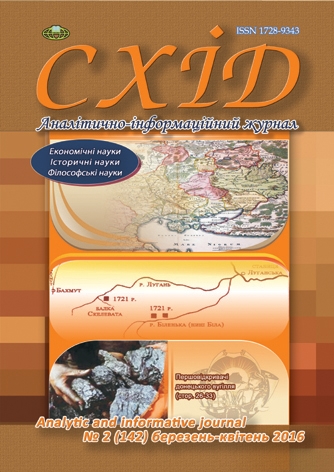Politics of the Russian empire in relation to the Tatar population of North Caucasus in the second half of ХVІІІ of item
DOI:
https://doi.org/10.21847/1728-9343.2016.2(142).70444Keywords:
North Caucasus, Kuban, Tatars, Russian empire, genocide, colonialAbstract
At the beginning ХХІ of century Ukraine again ran into imperial ambitions of Russian Federation, that resulted in a military collision and occupation of part of territory of our state. For successful opposition with the newest colonial expansion it is necessary to appeal to historical experience and analysis of basic strategies and methods of colonial Russian politics. The special personal interest causes the politician of the Russian empire in relation to the Tatar population in fact Crimea again found oneself under control Russia, and in that Tatars fold a native population. One of not popular episodes of long duration expansionist politics of the Russian empire there is her politics in relation to ногайських Tatars that inhabited North Caucasus. In the article basic directions of colonialist politics of the Russian empire are examined in relation to the Tatar population of North Caucasus during expansion in Crimea and on Caucasus the circumstances of elimination of ногайских Tatars that lived on Kuban, genocide in relation to the habitants of this territory, basic strategies, that combined for itself подрыв unities of the Tatar association, exasperating enmity between the Tatar clans and direct elimination of Tatars by direct military aggression, Are illuminated in the second half of ХVІІІ of item.
References
Shcherbina F. A. (1910), History of Kuban Cossack Host, Typography Kuban Regional Board, Ekaterinodar, Vol. 1, 700 p. (rus).
Potto V. A. (2007), The Caucasian war, Volume 1: From the earliest times to the Yermolov, Tsentrpoligraf, Moscow, 527 p. (rus).
Khodarkovsky M. (2002),Russia's Steppe Frontier: the Making of a Colonial Empire (1500-1800), Indiana University Press,Bloomingtonand Indianopolis, 290 p. (eng).
Barrett Th. М. (1999), At the Edge of Empire: The Terek Cossacks and the North Caucasus Frontier (1700-1860), Colo, Boulder, 467 р. (eng).
Bashler J. (2005), Essay on the general history [trnasl.], Nicka Center Publishing, Kyiv, p. 100 (ukr).
Beauvois D. (2007), Russian authorities and the Polish gentry inUkraine(1793-1830) [trnasl. from French], Calvary Publishing, Lviv, p. 25-26 (ukr).
Under the banner ofRussia: Collection of archival documents (1992), Russian book, Moscow, p. 80-81 (rus).
Ratushnyak V. N. (2005),Kubanhistorical chronicles. A little-known of the famous: Essays, Prospects of Education, Krasnodar, p. 31 (rus).
Downloads
Published
How to Cite
Issue
Section
License
Copyright (c) 2016 Dmytro Bilyi, Vasyl Futulujchuk

This work is licensed under a Creative Commons Attribution-NonCommercial-NoDerivatives 4.0 International License.
1. Authors bear responsibility for the accuracy of facts, quotations, numbers and names used.
2. Manuscripts are not sent back.
3. The publisher does not always agree with the authors' opinion.
4. The authors reserve the right to authorship of the work and pass the first publication right of this work to the journal under the terms of a Creative Commons Attribution Non-Commercial License, which allows others to freely distribute the published research with the obligatory reference to the authors of the original work and the first publication of the work in this journal.
5. The authors have the right to conclude separate supplement agreements that relate to non-exclusive work distribution in the form in which it has been published by the journal (for example, to upload the work to the online storage of the journal or publish it as part of a monograph), provided that the reference to the first publication of the work in this journal is included.

